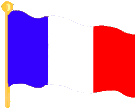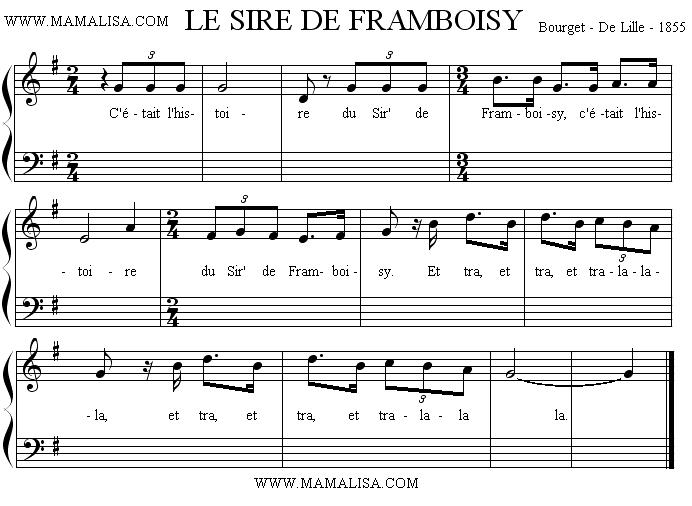Le sire de Framboisy
Song from 1855
Le sire de Framboisy
The Lord of Framboisy
Chanson enfantine
Children's Song
(French)
(English)
C'était l'histoire du Sire de Framboisy,
C'était l'histoire du Sire de Framboisy.
Refrain
Et tra, et tra, et tra la la la
Et tra, et tra, et tra la la la
Avait pris femme, la plus belle du pays,
Avait pris femme, la plus belle du pays.
La prit trop jeune, bientôt s'en repentit,
La prit trop jeune, bientôt s'en repentit.
Partit en guerre, afin qu'elle murît,
Partit en guerre, afin qu'elle murît.
Revint de guerre après cinq ans et d'mi
Revint de guerre après cinq ans et d'mi.
N'trouva personne de la cave au chenil,
N'trouva personne de la cave au chenil.
App'la la belle trois jours et quatre nuits,
App'la la belle trois jours et quatre nuits.
Un grand silence, hélas, lui répondit,
Un grand silence, hélas, lui répondit.
Le pauvre Sire courut dans tout Paris
Le pauvre Sire courut dans tout Paris.
Trouva la dame, dans un bal à Clichy,
Trouva la dame, dans un bal à Clichy.
Corbleu, princesse, que faites-vous ici,
Corbleu, princesse, que faites-vous ici ?
Voyez, je danse, avecque mes amis
Voyez, je danse, avecque mes amis
Dans son carosse la r'mène à Framboisy.
Dans son carosse la r'mène à Framboisy
Il l'empoisonne avec du vert-de-gris,
Il l'empoisonne avec du vert-de-gris.
Et sur sa fosse il sema du persil,
Et sur sa fosse il sema du persil.
De cette histoire, la morale, la voici,
De cette histoire, la morale, la voici :
À jeune femme il faut jeune mari,
À jeune femme il faut jeune mari.
Here is the tale of the Lord of Framboisy,
Here is the tale of the Lord of Framboisy.
(Chorus)
And tra, and tra, and tra la la la
And tra, and tra, and tra la la la
Who had taken as wife the most beautiful girl in the country,
Who had taken as wife the most beautiful girl in the country.
Took her too young, quickly regretted it
Took her too young, quickly regretted it.
Went to war so that she could mature,
Went to war so that she could mature.
Returned from war after five and a half years,
Returned from war after five and a half years.
Found nobody from cellar to kennel,
Found nobody from cellar to kennel.
Called the fair lady for three days and four nights,
Called the fair lady for three days and four nights.
A great silence, alas, answered him,
A great silence, alas, answered him.
The poor Lord ran all over Paris,
The poor Lord ran all over Paris.
Found the lady at a ball in Clichy,
Found the lady at a ball in Clichy.
Egad*, princess, what are you doing here?
Egad, princess, what are you doing here?
See, I'm dancing, with my friends,
See, I'm dancing, with my friends,
In his coach, brings her back to Framboisy.
In his coach, brings her back to Framboisy.
He poisons her with verdigris,
He poisons her with verdigris.
And on her tomb he sowed parsley,
And on her tomb he sowed parsley.
Here is the moral to this tale,
Here is the moral to this tale:
For young woman, must be a young husband,
For young woman, must be a young husband.
Notes
-The chorus can also be found as "Et youp, et youp, et tralalala".
-Verdigris is copper carbonate found on weathered brass, bronze, and copper. It's toxic to humans.
*Regarding the definition of "Corbleu", it's a mild oath. Using the expression "corbleu" is like changing a curse to a less offensive expression. Examples in modern English would be changing "damn" to "darn", or "sh*t" to "shoot". In 19th century English it would be using an expression like "egad" (in the place of, "oh God", or "ah God") or "zounds" (in the place of, "God's wounds"). According to the publication, "Notes and Queries", Volume 86 from 1892, "...they say: Corbleu, instead of "Par le corps de Dieu"; Parbleu, instead of "Par Dieu"; Sabrebleu, instead of "Sacre Dieu..."
Comments
Written by Ernest Bourget and Laurent de Rillé.

Thanks and Acknowledgements
Many thanks to Monique Palomares for contributing this song! Translated by Monique Palomares and Lisa Yannucci.
Merci beaucoup!


























